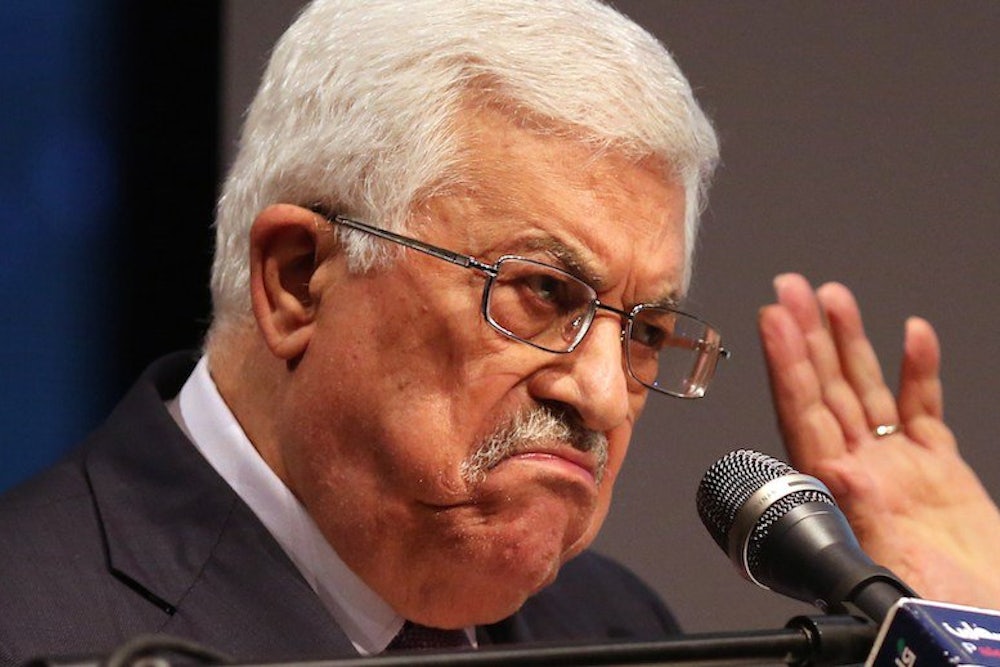Last week, an overwhelming majority of senators moved to cut funding to the Palestinian Authority (PA) as punishment for President Mahmoud Abbas’s decision to join the International Criminal Court (ICC). In a rare display of bipartisanship, 75 senators signed a letter to Secretary of State John Kerry, accusing Abbas of intentionally challenging “Israel’s legitimate right to defend its citizens and territory.” The lawmakers reminded Kerry that their 2015 appropriations bill prohibited funding for the PA if they initiated or actively supported an ICC investigation into alleged Israeli war crimes.
The PA, who submitted documents to join the ICC on New Year’s Eve, will be admitted to the court on April 1. The court would have retroactive jurisdiction to investigate war crimes dating back to June 13, 2014, meaning that the entirety of last summer’s Gaza War could fall under ICC scrutiny.
It is unclear why Palestinian membership in an international organization designed to prosecute war crimes challenges Israel’s right to self-defense—unless, of course, these senators are arguing that Israel’s right to self-defense includes the right to commit war crimes. When Israeli Prime Minister Benjamin Netanyahu froze $127 million in Palestinian tax revenues, the State Department called on both the Israelis and Palestinians to avoid actions “raise tensions.” Cutting a major economic lifeline to the Palestinians, at the behest of Netanyahu, would inevitably raise tensions. But this is hardly the first time members of Congress have moved to align themselves more closely with the Israeli right than with their own government.
When the State Department announced that they would continue to cooperate with the newly formed Fatah-Hamas unity government last year, Senator Rand Paul went rogue and introduced legislation aiming to cut all aid to the Palestinians until the new government agreed to “a lasting peace.”
The senator’s efforts to endear himself to the pro-Israel establishment hit an unexpected roadblock when the influential American Israel Public Affairs Committee (AIPAC) pushed back. “We are not supporting the Paul bill,” a spokesman told The Hill last year. “We believe the law currently on the books is strong and ensures that aid is contingent on key conditions that help maintain America’s influence, keep Israel secure and advance the peace process.” Paul’s bill, called the Stand with Israel Act of 2014, died in Congress shortly after.
The U.S. currently provides over $400 million a year in aid to the PA. A total cessation of funding would have been a humanitarian disaster. According to United Nations’ estimates, initial rebuilding after last summer’s Gaza War is pegged at $367 million. But it was a security, rather than humanitarian imperative that killed Paul’s legislation. Elliott Abrams, who served as deputy national security advisor to former President George W. Bush, described the Stand with Israel Act as “not smart legislation.” Primarily, he said, because a significant chunk of U.S. aid to the PA goes to the Palestinian security forces, which cooperate with the Israelis on counterterrorism operations. Last November, after the Temple Mount stabbing, a member of the Israeli Defense Forces told Al Monitor, “Terror operatives continue to be arrested and interrogated [by Palestinian security forces], while the number of arrests is either on an upward trend or remains stable. Security coordination with Israel continues to be sacred.”
Just nine months after pushing back on Paul’s proposed legislation, AIPAC has reversed course. “Thank you senators for signing this important letter,” the lobbying group posted on their website in response to their warning to Kerry. AIPAC confirmed on Monday that they now support suspending aid to the Palestinian Authority because of its recent efforts to join the International Criminal Court.
The appropriations law that the senators pointed to as the legal rationale for suspending aid may not actually require the U.S. to do so. While there is currently an investigation into war crimes committed by both sides during the 2014 Gaza War, it was initiated by the ICC prosecutor, not by the PA. It is possible to argue that by joining the ICC and granting the court jurisdiction in Gaza and the West Bank, the PA is “actively supporting” the investigation—which is also prohibited in the appropriations bill.
The absence of 25 senators from the letter should not necessarily be interpreted as a faction of support for Palestinian membership in the ICC. Notably absent was Senator Rand Paul. When asked why he declined to sign a letter that espouses policies he has promoted in the past, his press secretary Eleanor May explained that he has authored another bill, which goes even further than existing prohibitions in the appropriations bill. His bill, called the Defend Israel by Defunding Palestinian Foreign Aid Act, would immediately cut funding to the PA until they withdraw their ICC membership. AIPAC has not yet confirmed whether or not they will support Paul’s latest legislation.
At the time of publication, the State Department did not provide comment on the senators’ letter or indicate if they were considering pulling aid. In past briefings, State Department spokesperson Jen Psaki has suggested that it is up to Congress, not the State Department, to decide if and when to defund the PA. On January 5, she told reporters, “We clearly do see a benefit in the U.S. assistance that we do provide and have provided to the Palestinian Authority. It’s played a valuable role in promoting stability and prosperity, not just for Palestinians but for the region.”
Correction: A previous version of this article referred to Benjamin Netanyahu as president of Israel. He's the prime minister.
